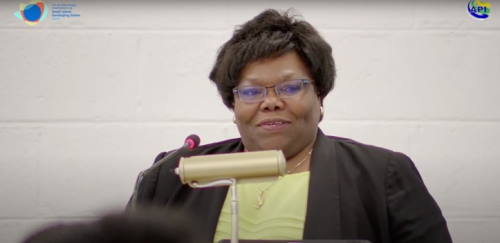 Director of ECLAC Caribbean Diane Quarless says that the international community will need to contribute more to support the development of Small Island Developing States; indeed, if the Sustainable Development Goals (SDGs) are not achieved across all countries, then it is the entire global community that assumes responsibility, since the commitment to implement Agenda 2030 was made collectively by all states. Director Quarless was speaking at a media breakfast in Port-of-Spain, Trinidad and Tobago, organized by the United Nations Information Centre for the Caribbean on Thursday.
Director of ECLAC Caribbean Diane Quarless says that the international community will need to contribute more to support the development of Small Island Developing States; indeed, if the Sustainable Development Goals (SDGs) are not achieved across all countries, then it is the entire global community that assumes responsibility, since the commitment to implement Agenda 2030 was made collectively by all states. Director Quarless was speaking at a media breakfast in Port-of-Spain, Trinidad and Tobago, organized by the United Nations Information Centre for the Caribbean on Thursday.
Speaking on revitalizing the push to achieve the SDGs by 2030 (17 goals that address critical areas for the enhancement of human wellbeing the protection of the environment), she notes that Caribbean countries face an uphill task because of burdensome debt and debt service with small, undiversified economies, exposure to devastating climate induced natural hazards, limited technical and institutional capacity and inadequate access to low-cost financing.
“The international community has not shown the empathy to Small Island States that have been graduated… You have a per capita income that is over a threshold that says… you are big boys now; you can stand on your own. So, you are not getting access to concessionary financing.”
When asked about the possibility of not achieving the SDGs, Director Quarless said, “It is not going to be a failure on us, it is going to be a failure of the global community, because it is a global commitment that has been made. This is why I spoke about intergenerational and intragenerational equity and the developed countries have a responsibility to lift the developing ones… and that lift means you provide the resources for them to achieve.”
Addressing the gap in financing the SDGs, Resident Coordinator for the UN System in Trinidad and Tobago Joanna Kazana said the world has more than adequate resources to achieve sustainable development. To make her point, she compared the sum spent on defense worldwide for the last few years to the amount spent on global development challenges.
“This year it is going to be almost three trillion dollars globally. We have the money, we have plenty of money, we are just spending it on activities that are completely destructive and throwing us back to the level of development that we have worked so hard to achieve. We have to change the course.”
UN Resident Coordinator for Jamaica Dennis Zulu remarked that there is a sustainable development gap between the UN and world leaders and the common person, as many people around the world do not know about the SDGs.
“The member States are accountable not to us as staff members, but also to their duty to others… and those people in the countries that they come from.”
The Caribbean-focused discussion follows the recently concluded SDG Summit, and the halfway assessment point toward the 2030 Agenda. In 2024, Antigua and Barbuda will host the Fourth International Conference on Small Island Developing States, where Caribbean SIDS and others around the world will focus on practical and impactful solutions to achieve sustainable development.











